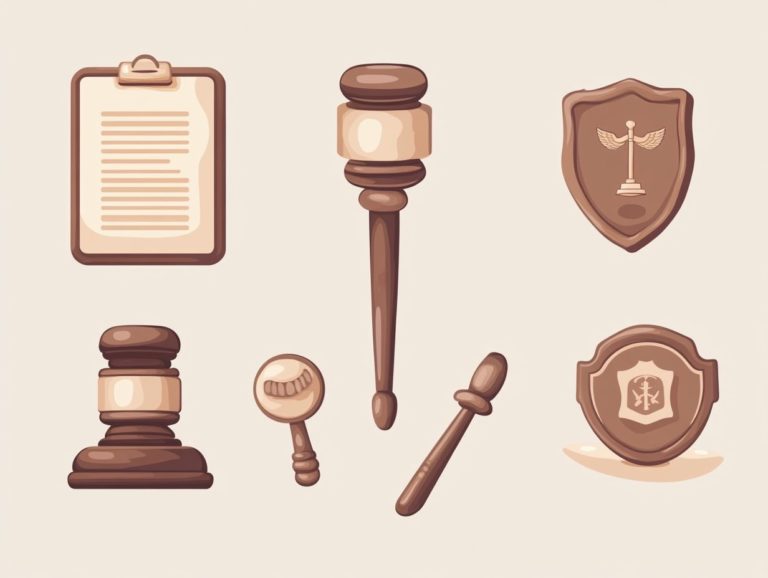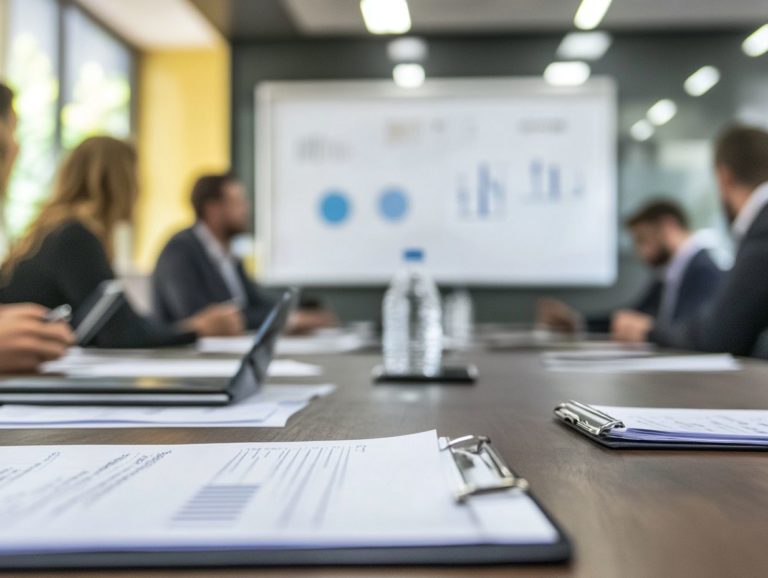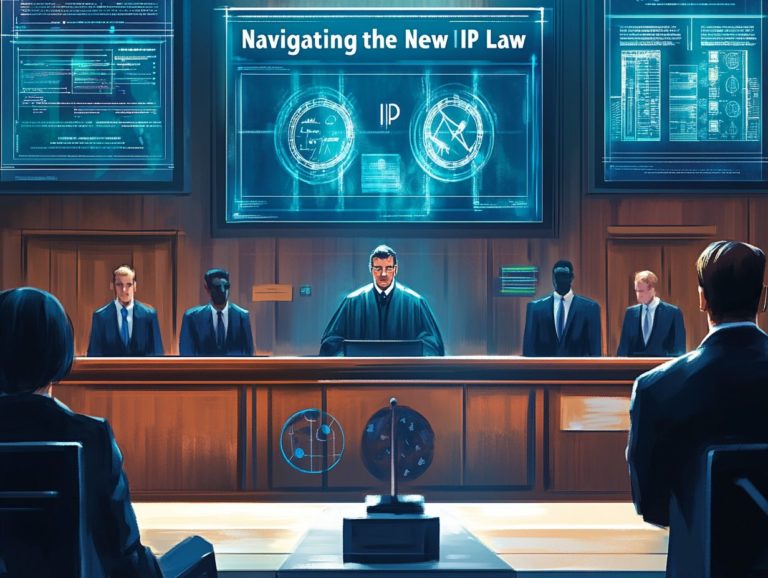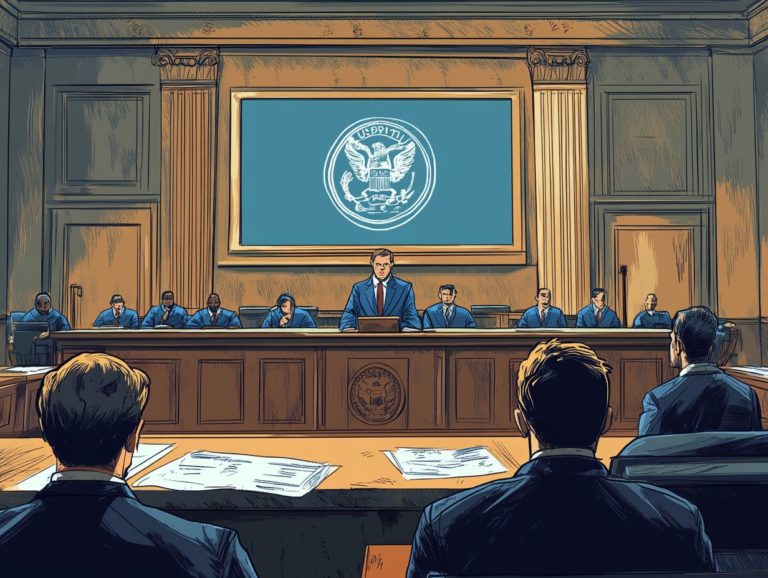How to Prepare Witnesses for IP Litigation
Intellectual property lawsuits can be complex and demanding, often relying on the strength of witness testimony.
Preparing witnesses effectively is essential for the success of your case. This article explores the significance of witness preparation and outlines strategies for selecting and training key individuals who can greatly influence the outcome.
From conducting mock depositions to mastering cross-examinations, you ll find practical tips to help your witnesses communicate clearly and confidently.
Learn how thorough preparation can enhance the credibility of your witnesses and strengthen your legal strategy.
Contents
- Key Takeaways:
- The Importance of Witness Preparation
- Identifying and Preparing Key Witnesses
- Effective Strategies for Witness Preparation
- Tips for Successful Witness Testimony
- Frequently Asked Questions
- What is IP litigation and why is it important?
- Why is witness preparation important in IP litigation?
- What are the steps involved in preparing witnesses for IP litigation?
- How should witnesses be selected for IP litigation?
- What are some tips for effectively preparing witnesses for IP litigation?
- What are some common mistakes to avoid when preparing witnesses for IP litigation?
Key Takeaways:

Witness preparation is crucial in IP litigation, as it increases the chances of success and reduces the risk of damaging testimony. For a comprehensive understanding of the process, refer to what to expect during an IP litigation process. Key witnesses should be carefully chosen and thoroughly prepared using techniques like mock depositions and evidence review. Effective communication and confident handling of cross-examination are essential for successful witness testimony in IP litigation.
Understanding Intellectual Property Lawsuits
Intellectual Property (IP) lawsuits involve legal disputes aimed at protecting and enforcing intellectual property rights, such as patents, trademarks, and copyrights. These cases often unfold in specialized courts, requiring a solid grasp of both the legal framework and the technical details involved.
As you navigate the litigation process, address crucial issues like document retrieval, cost recovery, and managing your litigation team all while ensuring compliance with court procedures and protecting attorney-client privilege.
In IP litigation, you will face various types of cases, each with unique challenges that require specialized knowledge. Patent attorneys will guide you through the complexities of patent claims and defenses, ensuring that every filing is both precise and strategically sound.
Trial preparation is essential; careful planning and thorough evidence gathering are key to presenting a compelling case. The disclosure process can become contentious, where the challenge lies in securing important information while maintaining client confidentiality.
Be mindful of the financial implications. The costs associated with IP litigation can escalate quickly, making it essential to have skilled legal counsel that can strategize and control expenses throughout your litigation journey.
The Importance of Witness Preparation
Witness preparation is vital in litigation, especially in intellectual property cases, where expert testimony can significantly influence the outcome.
When a witness is well-prepared, it not only boosts their testimony’s credibility but also ensures that difficult technical ideas are communicated clearly to the court. This preparation involves addressing emotional challenges, honing communication skills, and understanding trial logistics.
This thorough preparation enables expert witnesses to present their opinions confidently, shaping how the judge or jury views the case.
Why Witnesses Need to be Prepared
Thorough witness preparation is essential for effectively sharing knowledge and insights during legal proceedings, particularly in high-stakes IP litigation where their expertise can significantly influence the outcome. For more information, check out this guide on how to prepare an IP litigation budget.
Preparation helps manage emotional triggers and reduces anxiety often tied to courtroom testimony, ensuring you articulate your expert opinions clearly. By understanding potential challenges in cross-examination, you can navigate the complexities of the litigation process more effectively.
This preparatory work enhances emotional resilience and strengthens overall credibility, crucial for persuading juries and judges. Engaging in emotional intelligence training can help recognize and manage responses, leading to a more composed presentation of facts.
Practicing mock testimonies can reveal psychological barriers, allowing you to proactively address these issues.
Feeling secure and prepared significantly reduces the chances of prolonged litigation, translating into substantial cost savings for all involved. Thus, comprehensive witness preparation becomes not just a legal necessity, but also an economic advantage.
Identifying and Preparing Key Witnesses
Identifying and preparing key witnesses is a cornerstone of successful IP litigation. Their insights can profoundly influence the direction of your case.
The selection process requires a clear understanding of each potential witness s technical expertise and relevance. This ensures that those chosen can articulate their knowledge with confidence.
Once you ve pinpointed these key witnesses, provide them with comprehensive training and a solid grasp of litigation procedures, including the disclosure process. This equips them to deliver compelling expert testimony when it matters most.
Choosing the Right Witnesses

Choosing the right witnesses is pivotal for your litigation team s success, especially in intricate IP lawsuits. Expert witnesses must have relevant technical knowledge and the ability to communicate their insights clearly.
Focus on their credentials, experience in technical fields, and prior involvement in similar legal cases. This ensures you select credible witnesses who align with your case strategy, enhancing the overall persuasiveness of your arguments in court.
A solid selection of expert witnesses significantly impacts the jury’s perception and the court’s final decision. When a witness is well-versed in the nuances of the technology and has a history of effective communication, it boosts your litigation team s confidence.
Witnesses need to be strong and ready for tough questions to ensure your case shines. Their ability to break down complex concepts into layman’s terms makes the technical aspects more accessible and enriches your narrative.
Additionally, they must withstand intense cross-examinations, reinforcing their reliability and supporting the credibility of your entire litigation process.
Preparing Witnesses for Depositions and Trial
Preparing witnesses for depositions and trial is crucial in litigation, especially in the complex world of IP lawsuits. The stakes are exceptionally high.
This preparation involves educating witnesses about the deposition process, guiding them through potential questions, and emphasizing the significance of their expert testimony. Effective training also covers trial logistics, ensuring witnesses can present intricate information clearly and confidently.
A well-rounded training program includes role-playing and practice sessions that mimic the deposition environment. This approach allows witnesses to experience the dynamics of questioning and refine their responses in a supportive setting.
Such training boosts their comfort level and helps them maintain composure under pressure, impacting how their credibility is perceived.
Witnesses should grasp not only the questions they may encounter but also the intent behind those inquiries. This preparation enables them to deliver insightful and impactful answers that could sway the case in favor of the litigation team.
Effective Strategies for Witness Preparation
Don’t wait! Prepare your witnesses effectively to secure powerful testimony in your IP case. Engaging in mock depositions and role-playing exercises are invaluable tools to help them acclimate to the courtroom environment while refining their communication skills.
Reviewing and organizing evidence is crucial for presenting your arguments coherently. This ultimately enhances overall performance during testimonies.
In summary, effective witness preparation is essential for a successful IP litigation strategy. By following these guidelines, you can ensure your witnesses are well-prepared to contribute meaningfully to your case and understand how to protect your IP rights during litigation.
Mock Depositions and Role-Playing
Mock depositions and role-playing are key parts of witness training. They prepare you to handle courtroom testimony effectively.
These techniques give you the power to anticipate potential questions and craft your expert responses. This allows you to refine your testimony with precision.
During practice sessions, you may uncover emotional triggers that could impact your performance. This enables trainers to address these concerns and bolster your overall credibility in the eyes of legal counsel and the court.
By simulating real-life courtroom scenarios, these training methods enhance your understanding of courtroom dynamics. You ll feel more comfortable and confident when facing trial.
You ll develop a stronger grasp of your role in the legal process, which sharpens your communication skills and builds emotional resilience against the stress of cross-examination.
As attorneys and trainers guide you through various strategies, you ll cultivate critical thinking skills to tackle unexpected inquiries. Prioritizing the accuracy and integrity of your testimony is essential.
Ultimately, each practice session transforms into a powerful tool that equips you with the skills necessary for effective courtroom performance.
Reviewing and Organizing Evidence
Reviewing and organizing evidence is a crucial step in your trial preparation, especially in intellectual property (IP) litigation, where expert opinions can dramatically influence legal outcomes.
A well-structured trial bundle enables witnesses to articulate their statements clearly and coherently. This ensures that the most relevant information is at hand during testimony.
By honing communication skills and maintaining a logical flow of information, your litigation team can maximize the impact of the evidence presented in court.
Effective organization of evidence not only supports individual testimonies but also aligns with your broader litigation strategy. This creates a more compelling narrative for juries or judges.
Best practices involve:
- Categorizing documents by importance,
- Establishing a clear reference system,
- Ensuring that all team members are well-acquainted with the materials.
This careful preparation fosters collaboration and paves the way for seamless questioning during depositions. Ultimately, it fortifies your case.
Consequently, a well-organized approach enhances your chances of a favorable outcome, equipping you with the tools necessary to present your arguments persuasively.
Tips for Successful Witness Testimony
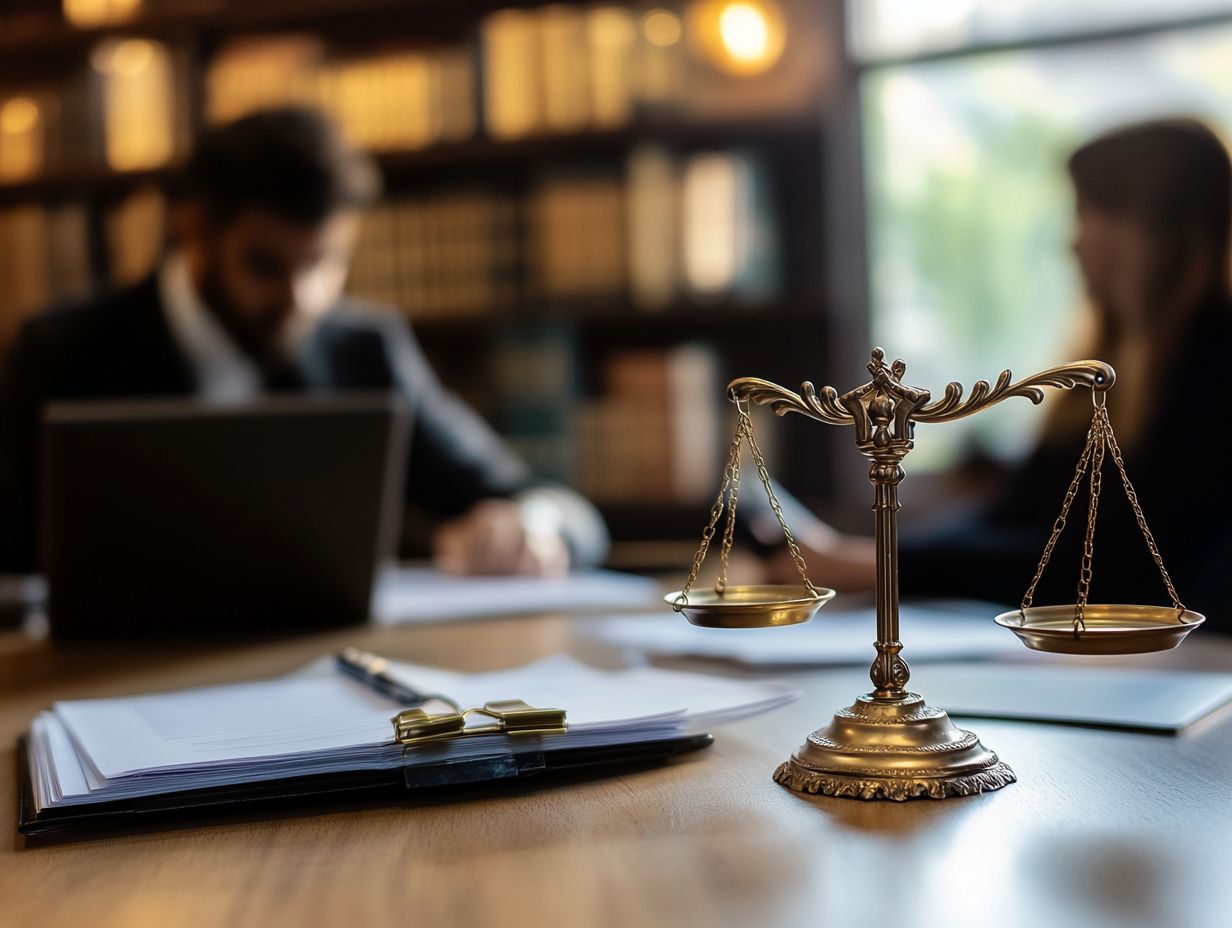
Achieving successful witness testimony demands careful preparation and a nuanced grasp of courtroom dynamics. This is especially important for expert witnesses whose insights can significantly influence the outcome of IP litigation.
Your communication skills are essential; they enable you to articulate your expert opinions with clarity and authority. Being thoroughly prepared for cross-examination boosts your credibility and elevates the overall impact of your testimony, playing a crucial role in your litigation team’s success.
How to Communicate Clearly and Confidently
Communicating clearly and confidently is vital for witnesses providing expert testimony. This ensures that complex technical information reaches the court effectively.
To navigate emotional barriers and anxiety that may surface during testimony, thorough trial preparation is crucial. This preparation includes practicing your statements and becoming familiar with courtroom dynamics.
By doing so, you can present your insights with poise, reinforcing your credibility and the strength of the case.
Beyond mere practice sessions, getting to know the physical layout and procedural nuances of the courtroom can significantly boost your comfort level.
Participating in mock trials or role-playing scenarios allows you to simulate real-life situations. This helps reduce nervousness while refining both your verbal and non-verbal communication skills.
Addressing emotional challenges, such as the fear of judgment or skepticism, gives you the power to articulate your expert opinions clearly. This leaves a lasting impression on the judge and jury.
This comprehensive approach sharpens your delivery and enhances the overall effectiveness of your testimony, leading to more persuasive arguments in litigation.
Handling Cross-Examination
Handling cross-examination effectively is an essential skill for you as a witness, especially in the realm of IP litigation. Expert testimony often faces rigorous scrutiny, making it crucial to manage this situation correctly.
Being well-prepared for the challenges that may arise during cross-examination can significantly enhance your credibility and reinforce the arguments put forth by your litigation team.
It’s crucial for you to be very familiar with the details of your testimony, as this knowledge gives you the power to respond clearly and confidently to probing questions.
Practicing role-playing scenarios with your legal team can alleviate anxiety and sharpen your spontaneous thinking for the actual proceedings.
Maintaining your composure helps you answer questions clearly and makes a good impression on the jury.
Navigating this situation well preserves your credibility and bolsters the overall case, ultimately contributing to a more compelling narrative for the court.
Frequently Asked Questions
What is IP litigation and why is it important?
IP litigation involves legal disputes about intellectual property, like patents and trademarks. It’s crucial because it protects rights and encourages innovation.
Why is witness preparation important in IP litigation?
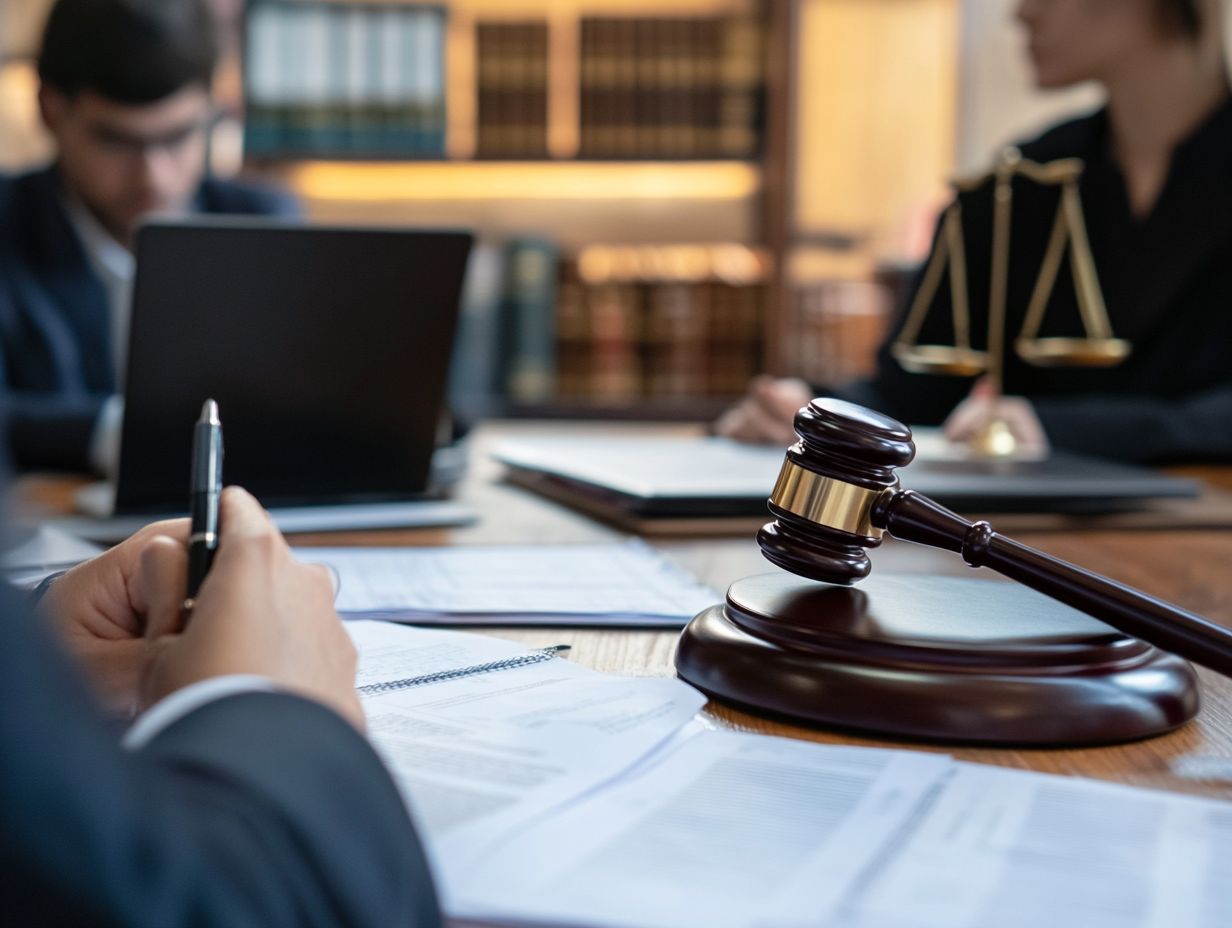
Witness preparation is crucial in IP litigation as the testimony of witnesses can make or break a case. Understanding the importance of IP education in litigation ensures that witnesses can effectively communicate their knowledge and evidence in court.
What are the steps involved in preparing witnesses for IP litigation?
The steps involved in preparing witnesses for IP litigation include identifying potential witnesses, conducting thorough interviews, reviewing relevant documents, creating an outline for their testimony, and conducting mock trial sessions. Understanding the role of expert witnesses in IP litigation can further enhance this preparation process.
How should witnesses be selected for IP litigation?
Witnesses should be selected based on their knowledge and involvement in the case, as well as their ability to effectively communicate in court. It is important to choose witnesses who can provide relevant and credible testimony.
What are some tips for effectively preparing witnesses for IP litigation?
Some tips for preparing witnesses for IP litigation include conducting mock trial sessions, providing clear and concise guidance, addressing any potential biases or weaknesses, and ensuring witnesses understand their role and the importance of their testimony. For a comprehensive overview, check out our guide on how to prepare for an IP litigation case.
What are some common mistakes to avoid when preparing witnesses for IP litigation?
Common mistakes to avoid when preparing witnesses for IP litigation include failing to provide adequate preparation, neglecting to address potential biases or weaknesses, and not properly explaining the legal process and expectations of witnesses.


